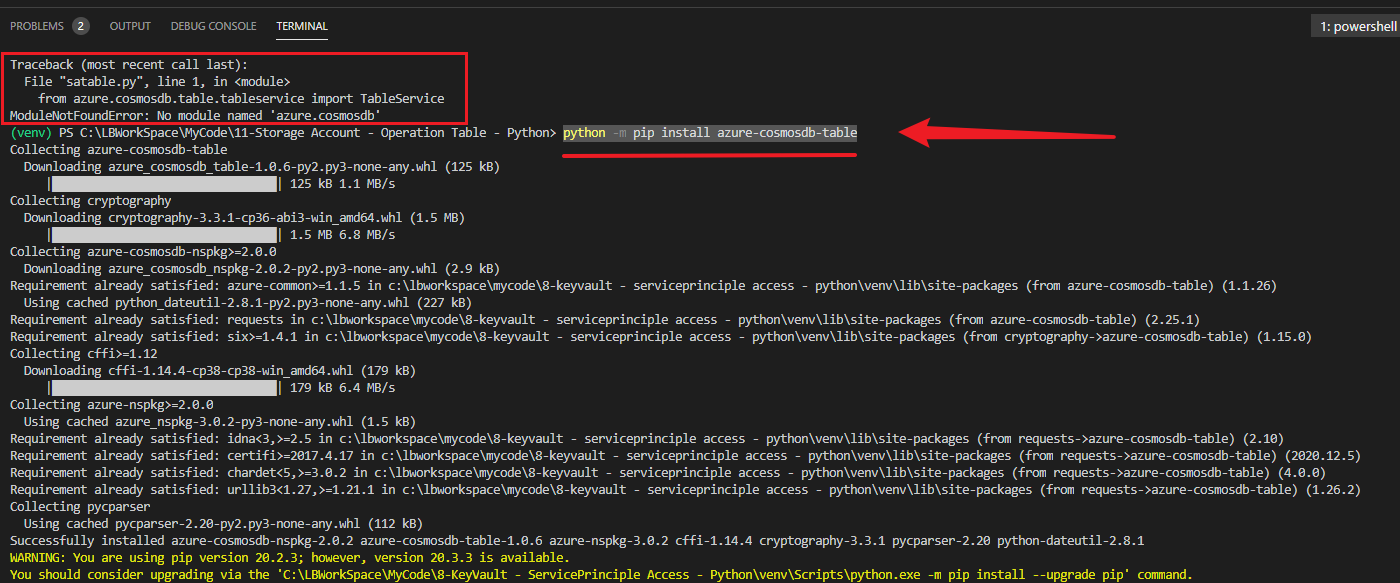【Azure 存储服务】Python模块(azure.cosmosdb.table)直接对表存储(Storage Account Table)做操作示例
什么是表存储
Azure 表存储是一项用于在云中存储结构化 NoSQL 数据的服务,通过无结构化的设计提供键/属性存储。 因为表存储无固定的数据结构要求,因此可以很容易地随着应用程序需求的发展使数据适应存储。Azure 表存储可存储大量结构化数据。 该服务是一个 NoSQL 数据存储,接受来自 Azure 云内部和外部的通过验证的呼叫。 Azure 表最适合存储结构化非关系型数据。 表存储的常见用途包括:
- 存储 TB 量级的结构化数据,能够为 Web 规模应用程序提供服务
- 存储无需复杂联接、外键或存储过程,并且可以对其进行非规范化以实现快速访问的数据集
- 使用聚集索引快速查询数据
- 使用 OData 协议和 LINQ 查询以及 WCF 数据服务 .NET 库访问数据
可以使用表存储来存储和查询大型结构化非关系型数据集,并且表会随着需求的增加而扩展。表存储包含以下组件:

(内容来源于 Azure: https://docs.azure.cn/zh-cn/cosmos-db/table-storage-overview)
问题描述
是否有Python module可以直接对Storage Account Table(表存储)进行操作呢? 有的。在查询表存储的Python文档后,它使用的Python module于cosmosDB一样。在代码中引入azure.cosmosdb.table即可。
from azure.cosmosdb.table.tableservice import TableService from azure.cosmosdb.table.models import Entity
使用PIP安装azure-cosmosdb-table模块。在VS Code中执行: python -m pip install azure-cosmosdb-table

操作代码
通过 Python 开始使用 Azure 表存储和 Azure Cosmos DB 表 API
此示例介绍如何在常见的 Azure 表存储方案中使用用于 Python 的 Azure Cosmos DB 表 SDK。 该 SDK 的名称表示它适合与 Azure Cosmos DB 配合使用,但其实该 SDK 既适合与 Azure Cosmos DB 配合使用,也适合与 Azure 表存储配合使用,只不过每个服务具有唯一的终结点。 本文使用 Python 示例探索这些方案,以演示如何:
- 创建和删除表
- 插入和查询实体
- 修改实体
Python cosmosdb table模块中包含了对表的所有原子操作。以下代码示例中包含了:
- 创建表:create_table
- 将实体添加到表:insert_entity
- 更新实体:update_entity / insert_or_replace_entity
- 修改多个实体: with table_service.batch(tablename) as batch
- 查询实体: get_entity
- 查询一组实体: table_service.query_entities(tablename, filter="PartitionKey eq 'tasksSeattle'")
- 查询一部分实体属性:table_service.query_entities(tablename, filter="PartitionKey eq 'tasksSeattle'", select='description')
- 删除实体:delete_entity
- 删除表:delete_table
全部代码:
from azure.cosmosdb.table.tableservice import TableService from azure.cosmosdb.table.models import Entity ##连接到 Azure 表服务, account_key的内容在Azure Storage Account的门户中获取(Storage Account --> Access Keys) table_service = TableService(account_name='you storage account name', account_key='your storage account key', endpoint_suffix='core.chinacloudapi.cn') ##创建表 tablename='tasktable2' table_service.create_table(tablename) ##将实体添加到表 task = {'PartitionKey': 'tasksSeattle', 'RowKey': '001', 'description': 'Take out the trash', 'priority': 200} table_service.insert_entity(tablename, task) ## Same way: # task = Entity() # task.PartitionKey = 'tasksSeattle' # task.RowKey = '002' # task.description = 'Wash the car' # task.priority = 100 # table_service.insert_entity(tablename, task) ##更新实体 print('##更新实体') task = {'PartitionKey': 'tasksSeattle', 'RowKey': '001', 'description': 'Take out the garbage', 'priority': 250} table_service.update_entity(tablename, task) ##如果要更新的实体不存在,更新操作将失败。 如果要存储实体(无论其存在与否) print('##如果要更新的实体不存在,更新操作将失败。 如果要存储实体(无论其存在与否)') # Replace the entity created earlier task = {'PartitionKey': 'tasksSeattle', 'RowKey': '001', 'description': 'Take out the garbage again', 'priority': 250} table_service.insert_or_replace_entity(tablename, task) # Insert a new entity task = {'PartitionKey': 'tasksSeattle', 'RowKey': '003', 'description': 'Buy detergent', 'priority': 300} table_service.insert_or_replace_entity(tablename, task) ##修改多个实体 print('##修改多个实体') task006 = {'PartitionKey': 'tasksSeattle', 'RowKey': '006', 'description': 'Go grocery shopping', 'priority': 400} task007 = {'PartitionKey': 'tasksSeattle', 'RowKey': '007',"MyAddColumn":"you know, thing changed, life goes on.", 'description': 'Clean the bathroom', 'priority': 100} with table_service.batch(tablename) as batch: batch.insert_entity(task006) batch.insert_entity(task007) ##查询条目/实体 print('##查询条目/实体') task = table_service.get_entity(tablename, 'tasksSeattle', '001') print(task.description) print(task.priority) ##查询一组条目 print('##查询一组条目') tasks = table_service.query_entities( tablename, filter="PartitionKey eq 'tasksSeattle'") for task in tasks: print(task.description) print(task.priority) ##查询一部分实体属性 print('##查询一部分实体属性') tasks = table_service.query_entities( tablename, filter="PartitionKey eq 'tasksSeattle'", select='description') for task in tasks: print(task.description) # ##删除条目/实体 # print('##删除条目/实体') # table_service.delete_entity(tablename, 'tasksSeattle', '001') # ##删除表 # print('##删除表') # table_service.delete_table(tablename)
执行结果:

参考文档
什么是 Azure 表存储?:https://docs.azure.cn/zh-cn/storage/tables/table-storage-overview
通过 Python 开始使用 Azure 表存储和 Azure Cosmos DB 表 API: https://docs.azure.cn/zh-cn/cosmos-db/table-storage-how-to-use-python?toc=https%3A%2F%2Fdocs.azure.cn%2Fzh-cn%2Fstorage%2Ftables%2Ftoc.json&bc=https%3A%2F%2Fdocs.azure.cn%2Fzh-cn%2Fbread%2Ftoc.json
当在复杂的环境中面临问题,格物之道需:浊而静之徐清,安以动之徐生。 云中,恰是如此!


 浙公网安备 33010602011771号
浙公网安备 33010602011771号